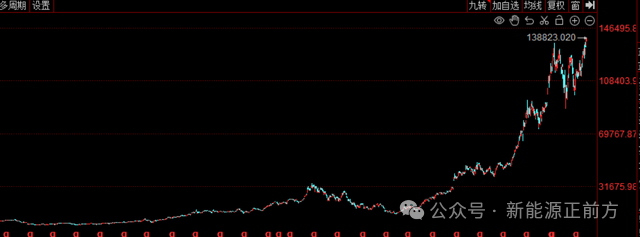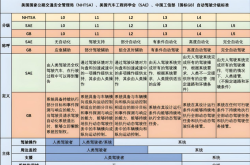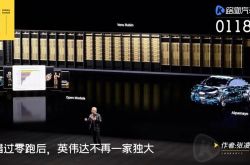Spending $15 billion on wealth management products but not repurchasing shares, what is Thalys afraid of?
![]() 11/12 2024
11/12 2024
![]() 542
542
This is the 1021st original article at the forefront of new energy. Click on the above 'New Energy on the Front' to follow and 'star' this account. The article only records the thoughts of 'New Energy on the Front' and does not constitute investment advice. The author does not have groups, does not charge for stock recommendations, and does not manage finances on behalf of clients.-----------
In an environment where policies strongly encourage companies to repurchase shares to reward investors, Thalys plans to spend $15 billion on wealth management products!
01 Spending $15 billion on wealth management products but not repurchasing shares
On October 21, Thalys announced that the company and its subsidiaries plan to use no more than $15 billion of their own funds for wealth management, investing in high-security, highly liquid, and low-risk wealth management products.
The company stated that, while ensuring sufficient liquidity for normal operations and effectively controlling risks, it and its subsidiaries intend to rationally utilize idle funds to purchase wealth management products, thereby improving capital utilization efficiency, increasing the company's capital gains, creating greater economic benefits, and generating more investment returns for the company and its shareholders.
From the company's mid-year report, as of the end of June 2024, the company's monetary funds exceeded $42.6 billion, but restricted funds accounted for 67%, or $28.7 billion, leaving only $13.898 billion freely available. With Thalys spending $15 billion on wealth management products, it remains to be seen whether this will affect the company's normal operations.
At a time when policies consistently encourage listed companies to repurchase shares, and many companies have responded with actual actions by issuing repurchase announcements, Thalys's plan to purchase large amounts of wealth management products stands out as incongruent, raising concerns about whether the company lacks confidence in its long-term development or believes that the current share price does not match the company's intrinsic value. Put simply, it suggests that the company believes its share price is artificially high or lacks confidence in the A-share market, anticipating potential adjustments. Even if a repurchase is considered, the company may wait for the share price to rebound first.
There may be various reasons, but an objective analysis reveals that, fundamentally, major shareholders have doubts about the company's long-term development!
The logic is simple: if the company is confident in its long-term development, believing it will continue to improve, sell more vehicles, and become more profitable, even if the share price currently appears relatively high, it will be considered absolutely low in the long run. Coupled with policy calls and the company's significant cash reserves, a share repurchase would be more appropriate than purchasing wealth management products.
Globally, for truly long-term growing companies, their share repurchases, at the time, were also considered high, but in hindsight, they were low.
Closer to home, after NVIDIA's second-quarter report was released recently, the board of directors approved an additional plan to repurchase $50 billion worth of shares. This additional repurchase plan was announced after NVIDIA's stock price had increased more than tenfold over the past two years, with a market value exceeding $3 trillion.

Other companies like Microsoft, Google, Apple, and more have all followed similar paths. So, those who want to defend Thalys can save their breath; if you disagree, that's your prerogative.
Sometimes, observing the different behaviors of companies in two markets helps understand why some can achieve long-term bull markets, while the A-share market is confined to short-term fluctuations. The gap between pillar companies in these markets is simply too great!
Of course, Thalys' concerns are not unfounded, as they are well aware of their origins and current challenges.
02 Selling one's soul for growth
Everyone is well aware that Thalys's transformation is attributed to its partnership with Huawei. From being a consistently loss-making Xiaokang Corporation to earning over $1.6 billion in profit in the first half of this year, largely due to the success of the M series, especially the M9. It is evident that without Huawei, there would be no Thalys.
This is not to diminish Thalys; on the contrary, during previous coverage, 'New Energy on the Front' has always emphasized Thalys's prowess, especially in selecting partners. Each partnership has been strategically advantageous and highly effective.
Thalys's actual controllers, the Zhang family, initially specialized in spring processing and later became a spring supplier for Changan Automobile seats, leveraging this relationship to venture into motorcycle and automotive shock absorber production. Subsequently, through a series of fortunate events, they established Dongfeng Yu'an Vehicle Co., Ltd. (later renamed Dongfeng Xiaokang) with Dongfeng Motor Corporation, launching one of the three domestic legendary minivans, the Dongfeng Xiaokang.
As sales of minivans declined and the wave of new energy vehicles brewed, Xiaokang obtained the eighth new energy vehicle production license in China in 2017 and launched new energy models SF5 and SF7 in 2018, which faced dismal sales due to various reasons.
Then, in 2019, Xiaokang partnered with Huawei. Their initial collaboration on the Huawei Smart Selection SF5 was less successful, but after Huawei's deeper involvement in 2021, the AITO Wenjie brand achieved great success.
Looking back, one cannot help but admire Controller Zhang Xinghai's ability to seize opportunities. How did he convince a much larger enterprise to collaborate with him despite his company's relatively weak position? Crucially, these partnerships have generally been very successful.
This requires strong timing, insight, execution, and a bit of luck.
If you don't believe it, try convincing someone or some enterprise much stronger than you to collaborate. Even finding a partner of similar caliber can be difficult, often leading to unsatisfactory outcomes.
This is evident from an anecdote about the collaboration between Xiaokang and Huawei.
It is rumored that in 2019, Yu Chengdong, Chairman of Huawei's Intelligent Automobile Solutions BU, was seeking partnerships with automakers across China. Amid struggling sales of their two new energy vehicle models, Zhang Xinghai was also actively seeking partners. Upon learning of Yu's search, Zhang immediately sent Xiaokang's Chief Technology Officer to test drive the SF5 at Huawei's Songshan Lake base in Dongguan. Yu Chengdong, unable to refuse, eventually tested the car, leading to a successful collaboration.
Such insight and execution explain their success.
Despite the current success of Wenjie, Thalys cannot avoid the fact that this success is more attributable to Huawei than to the original Xiaokang team.
From various reports, it is evident that Huawei has played a significant role in developing Wenjie models, which are ultimately sold through Huawei channels. Consumers purchase these vehicles due to Huawei's involvement, with Xiaokang primarily providing the manufacturing license, essentially acting as a contract manufacturer.
Although the company has refuted these rumors several times, the market remains skeptical. Objectively speaking, the company has not provided sufficient evidence to dispel these doubts.
Regardless of whether Thalys has 'sold its soul for growth' or retained its essence, it is undeniable that Huawei's contribution to Wenjie's success is paramount. If Thalys were to completely sever ties with Huawei (an unlikely scenario) or if Huawei were to reduce its support, the future of Wenjie would remain uncertain, hanging like a sword over Thalys, and this scenario is increasingly becoming a reality.
03 A sword hanging over Thalys
Huawei's previous dedication to Xiaokang was not only aimed at establishing a benchmark to attract other manufacturers but also harbored Yu Chengdong's ambition. Various indications suggest that Yu aims for Huawei to manufacture vehicles independently, with Wenjie serving as a test case. Once the entire supply chain is established, obtaining a vehicle manufacturing license would be straightforward given Huawei's influence.
However, as we know, after Ren Zhengfei firmly decided against manufacturing vehicles and opted for the Bosch path, accelerating collaboration with more automakers became inevitable. Since last year, collaborations under HarmonyOS Intelligent Drive have poured in, speeding up partnerships with BAIC, SAIC, GAC, Changan Automobile, Chery, JAC, and others, with Chery and JAC generating the most buzz.
Collaborating with more automakers to sell more vehicles aligns with Huawei's interests, making this path inevitable. Conversely, this poses a significant disadvantage for Thalys.
Transitioning from being Huawei's sole favorite to competing among many, Thalys must now navigate not only the broader automotive market but also the competition for Huawei's resources among its partner automakers.
If consumers can buy Wenjie for Huawei's technology, they can equally opt for Xiangjie or future collaborations.
As other manufacturers' collaborations with Huawei become more successful, Thalys's significance diminishes, and Huawei's resource allocation to Thalys will gradually decrease as more partners share these resources.
This issue will become increasingly thorny over time. For Thalys, the hope lies in establishing Wenjie as a powerful brand before other manufacturers achieve great success with Huawei, ensuring its appeal remains strong even without Huawei's support. Ultimately, the company must independently master all new energy vehicle manufacturing technologies.
Does Thalys have such confidence?
Judging from the company's decision to spend $15 billion on wealth management products amidst strong policy encouragement for share repurchases, it seems that confidence may not be abundant.




